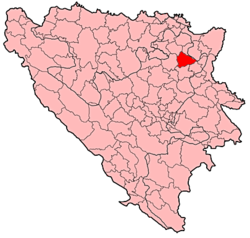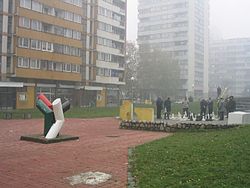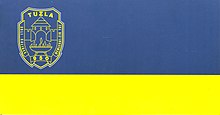Tuzla
Tuzla | |
|---|---|
 | |
|
Coat of arms of Tuzla Coat of arms | |
 Location of Tuzla within Bosnia and Herzegovina. | |
| Country | |
| Canton | Tuzla Canton |
| Area | |
• Total | 302 km2 (117 sq mi) |
| • Density | 54/km2 (140/sq mi) |
| Time zone | UTC+2 (EET) |
| • Summer (DST) | UTC+3 (EEST) |
| Area code | +387 35 |
| Website | http://www.tuzla.ba |

Tuzla is a city and municipality in Bosnia and Herzegovina. At the time of the 1991 census, it had 131,000 inhabitants. Taking the influx of refugees into account, the city is currently estimated to have 174,558 inhabitants.[1] After Sarajevo,and Banja Luka, Tuzla is the third largest city in Bosnia and Herzegovina, and the seat of the Tuzla Canton and Tuzla Municipality. The name "Tuzla" is derived from the Turkish word for salt, and refers to the extensive salt deposits found underneath the city.
Geography
Tuzla is located at 44°32′17″N 18°40′34″E / 44.53806°N 18.67611°E,in the northeastern part of Bosnia, settled just underneath the Majevica mountain range, on the Jala river. The central zone lies in an east-west oriented plain, with residential areas in the north and south of the city located on the Ilinčica, Kicelj and Gradina hills. The climate is moderate continental.
History
First mentioned in 950 as a county under Hungarian rule, the town was later referred to by historians as Soli. Soli means "salts" in the Bosnian, Croatian and Serbian language and the city's present name means "place of salt" in Turkish. However, there is enough archaeologic evidence to suggest that Tuzla was a rich neolithic settlement, and hence inhabited continuously for more than 6,000 years which makes Tuzla one of the oldest European settlements with sustained living. An open-air museum at Solni Trg, opened in 2004, tells the story of salt production in Tuzla.
On October 2, 1943, Tuzla became the largest liberated town in Europe to the time.[citation needed] In December of 1944, the city was unsuccessfully attacked by Chetnik forces of Draža Mihailović along with the Serbian Assault Corps.[2][3] After the war it developed into a major industrial and cultural centre during the communist period in former Yugoslavia. In the 1990 elections the Reformists won control of the municipality being the only municipality in Bosnia where non-nationalists won. During the Bosnian war, 1992-1995 the town was the only municipality not governed by nationalist authorities, and was besieged by Serb nationalist forces.
Additionally, the town was not spared the atrocities of war in Bosnia.
On May 25, 1995, a attack on Tuzla killed 71 people, mostly children, in Tuzla massacre.
Demographics

Demographics in Tuzla municipality:
1971 Census
total: 107,293
- 1,153,271 (49.65%) - Bosniaks
- 27,735 (25.84%) - Croats
- 21,089 (19.65%) - Serbs
- 2,540 (2.36%) - Yugoslavs
- 2,658 (2.47%) - others and unknown
1981 Census
total: 121,717
- 52,400 (43.05%) - Bosniaks
- 24,811 (20.38%) - Croats
- 20,261 (16.64%) - Serbs
- 19,059 (15.65%) - Yugoslavs
- 5,186 (4.26%) - others and unknown
1991 Census
total: 131,618
- 62,669 (47.61%) - Bosniaks
- 21,995 (16.71%) - Yugoslavs
- 20,398 (15.49%) - Croats
- 20,271 (15.40%) - Serbs
- 6,285 (4,77%) - others and unknown
Town of Tuzla, itself:
total: 83,770
- 44,091 (52.63%) - Bosniaks
- 16,302 (19.46%) - Yugoslavs
- 13,137 (15.68%) - Serbs
- 6,328 (7.55%) - Croats
- 3,912 (4.66%) - others and unknown

Contemporary Tuzla
The city has Europe's only salt lake as part of its central park; more than 100,000 people visit its shores every year. One of the most influential writers in the Balkans, Meša Selimović hails from Tuzla. In addition, Tuzla hosts the annual Meša Selimović book festival (in July), where an award for the best novel written in the languages of Bosnia and Herzegovina, Croatia, and Serbia and Montenegro is presented. The first professional theatre in Tuzla, Narodno Pozorište u Tuzli, was founded by the brothers Mihajlo and Živko Crnogorčević in 1944.
Tuzla is the seat of the Tuzla Canton, which is a canton of the Federation of Bosnia and Herzegovina, as well as of Tuzla Municipality, which is one of the 13 municipalities that together constitute the Tuzla Canton. Administratively, Tuzla is divided into 39 mjesne zajednice (local districts).
Apart from Tuzla, the municipality incorporates several other adjacent settlements, including the town of Gornja Tuzla (Upper Tuzla), as well as the villages of Husino, Par Selo, Simin Han, Obodnica, Kamenjaši, Plane, Šići, Slavinovići, and others.
The Mayor of Tuzla Municipality is Jasmin Imamović, a writer and lawyer born in 1957, of the Social Democratic Party of Bosnia and Herzegovina. He was reelected to a second term in 2004.
The City council of Tuzla has 30 members, of the following parties:
- Social Democratic Party of Bosnia and Herzegovina (SDP) - 14 members
- Party of Democratic Action (SDA) - 6 members
- Bosnian Party (BOSS) - 4 members
- Party for Bosnia and Herzegovina (SBiH) - 2 members
- People's Party Work for Betterment (Narodna stranka Radom za boljitak) - 2 members
- Croatian Democratic Union of Bosnia and Herzegovina (HDZ) - 2 members.
The Chairwoman of the City Council, Nada Mladina, is a member of the SDP. Tuzla is twinned with Bologna in Italy, L'Hospitalet de Llobregat in Spain, Pécs in Hungary and Osijek in Croatia, as well as with Ravenna province in Italy.
Extractions of the city's salt deposits, particularly in the 20th century, have caused sections of the city center to sink. Structures in the "sinking area" either collapsed or were demolished, and there are few structures in the city that predate the 20th century, despite the fact that the city was founded over 1000 years ago.
Tuzla has an international airport located at Dubrave (IATA code: TZL), and an effective and well developed public bus network. There are plans to introduce a trolleybus network in the city soon.
The airport was opened to civilian aircraft only recently. The airport had comprised a portion of "Eagle Base", an American military base that has been home to NATO troops serving in SFOR, Bosnia's stabilization force.
Several sports teams from Tuzla have participated in international competitions. Almost all of Tuzla's sports teams are named Sloboda, meaning freedom. The most popular sports in Tuzla include football (FK Sloboda); basketball (KK Sloboda-Dita[1]), karate (KBS Tuzla-Sinalco) and many others. The women's basketball team KK Jedinstvo-Aida were European club champions in the late eighties, with the most famous sportswoman from Tuzla in their midst - Razija Mujanović. First and oldset sport in Tuzla is gymnastics.
Tuzla is home to the University of Tuzla, with more than 10,000 students.
Also existing in Tuzla is the Cardiovascular Clinic, a part of the Clinical Center and the top institution for cardiology and cardiac surgery in the country.
On September 1, 2007, 6980 couples kissed for 10 seconds in Tuzla, Bosnia erasing the previous Guinness World kissing Records of the Philippines and Hungary (for synchronised osculation in 2004 with 5327 Filipino couples, overtaken by Hungary in 2005 with 5875 couples; Filipinos came back in February this year with 6124 couples but the Hungarians responded in June with 6613 couples). The record now awaits official certification.[4]
Tuzla has become the hip hop center in the Balkans. The transformation to this happened between the release of Edo Maajka's first two albums and that the first hip hop show is located there fmjam.
Twin cities
External links
- Gymnastics club Tuzla Template:Bs icon
- Tuzla Map - Map of Tuzla Template:Bs iconTemplate:En icon
- Radio Slon, with a website on Tuzla Template:Bs icon
- An unofficial website Template:Bs icon
- Kapija 25.05.1995.godine


